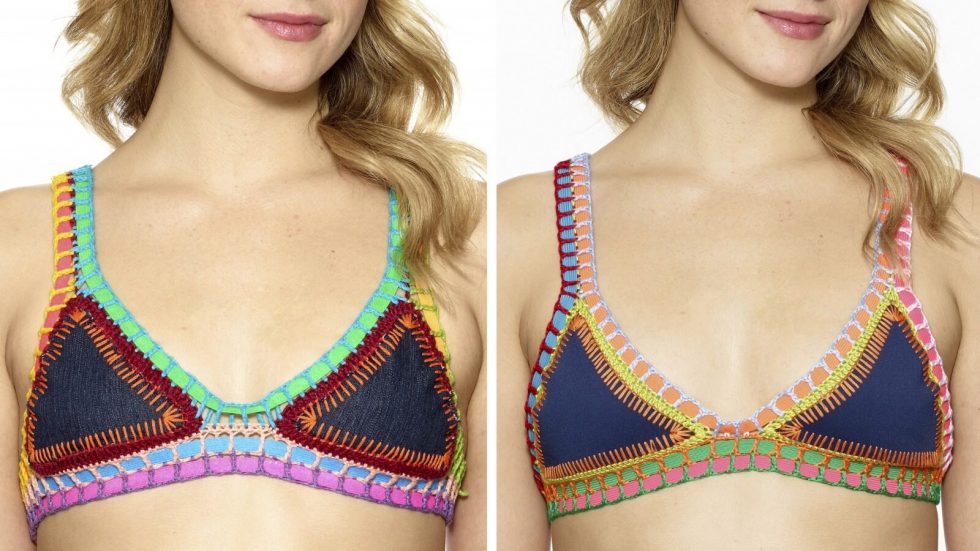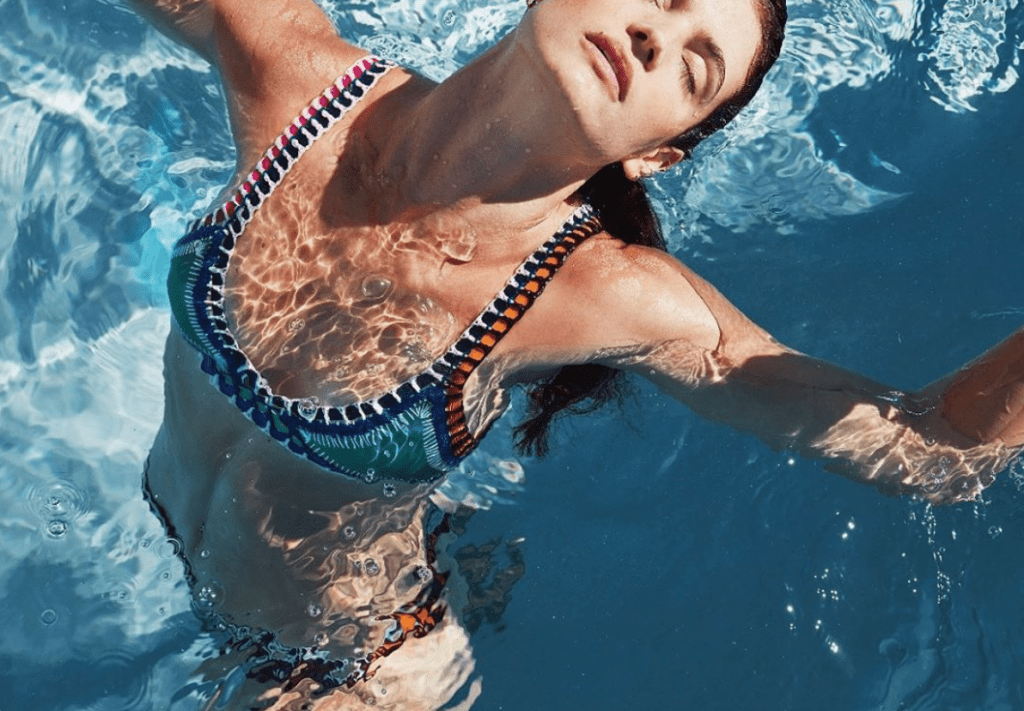In June 2018, a little-known name in swimwear filed what would become a headline-making lawsuit. In a complaint initially lodged in federal court in California, Brazilian artisan Maria Solange Ferrarini accused a New York-based brand called Kiini of stealing her bikini design and passing it off as its own original creation. As a result, counsel for Ferrarini, then 61, set out claims of copyright and trade dress infringement, as well as unfair competition, common law conversion, among others, against the burgeoning bikini brand, and sought monetary damages in the millions.
After the case was transferred to a New York federal court and on the heels of Judge Lorna Schofield dismissing a handful of Ferrarini’s claims against Kiini, while still enabling her copyright infringement claim against Kiini to go forward, the fight over a crocheted bikini design – which the New York Times called a demonstration of “the fine, sometimes indistinguishable line separating inspiration and theft” in fashion – is reaching a fever pitch.
In a lengthy motion for summary judgment filed on Friday, counsel for Kiini claims that the swimwear brand is entitled to an early (i.e., pre-trial) victory, as Ferrarini lacks the necessary legal basis to prevail on her copyright infringement claim.
Setting the stage, Kiini claims that designer Ipek Irgit – who is also named as a defendant in the case – drew “on years of crochet experience and other inspirations [when she] created a bikini design involving loops of elastic passing through crochet hoops.” That very bikini would come to be the center point of Irgit’s brand, after landing on magazine covers, appearing in seemingly countless Instagram posts, being knocked-off by an array of other brands (including Victoria’s Secret), and grossing nearly $10 million in sales, according to the New York Times.
In June 2014, People magazine called Kiini’s brightly-hued, knitted-and-woven offering “the hottest bikini [of the] summer.”
In furtherance of her copyright infringement claim, Ferrarini has argued that Irgit hijacked the bikini design after purchasing one of her handmade bikinis, which she sells on the beach near her home in Trancoso, Brazil, in 2012, a year before she launched her Kiini label. Irgit then – allegedly – sent photos of the bikini she bought from Ferrarini to a Chinese manufacturer in order to make a prototype shortly thereafter.
“She did not copy the design; she did not steal the design; she did not infringe on anyone else’s design,” Kiini states in the filing. The brand further argues that while Ferrarini claims that she first starting selling her bikinis on the beach in Brazil in 1998, she “never attempted to sell her bikinis outside of Trancoso and has never engaged in any marketing of her bikinis.”
More importantly, Kiini asserts that Ferrarini did not “attempt to enforce any intellectual property rights arising from the bikini” design until she filed suit against Kiini in the summer of 2018. In fact, Ferrarini “sat on any rights she may have had and did not file her claim until well after the statutory period ran.” In short, Kiini claims that Ferrarini waited too long and now, her claim is barred by the relevant statute of limitation, the legal rule that holds that a copyright-specific action must be commenced within 3 years of the claim accruing.

According to Kiini, the clock on that 3 year period began to run when Ferrarini first learned that Kiini was selling its allegedly infringing bikinis, which Kiini claims dates back “as early as 2013 or 2014” because that is when Ferrarini “admitted that she had actual knowledge of the marketing of the Kiini bikini.”
And even if Ferrarini had not admitted in a deposition that she was not aware of Kiini’s lookalike bikini back in 2013 or 2014, Kiini claims that the “extensive promotion and sale of [its] bikini” between “May 2014 and September 2015,” alone – including media attention “in virtually all of the big-name fashion publications … across the globe,” including “in[Ferrarini’s] native Brazil” – essentially put Ferrarini on notice of the bikini and started the clock on the 3 year period.
By failing to act within the allotted amount of time, Kiini claims that Ferrarini’s copyright claim is now “time barred as a matter of law,” and thus, Kiini is entitled to summary judgment (or a judgment entered by the court without a full trial when the record establishes that “there is no genuine dispute as to any material fact”) on the copyright claim.
But Ferrarini did not merely fail to initiate legal action in a timely manner. Kiini claims that she has fallen short in making her copyright infringement case in another important respect: she lacks a valid copyright registration.
While Ferrarini was, in fact, issued a copyright registration by the U.S. Copyright Office in 2018, Kiini takes issue with the validity of that registration. It argues that “Ferrarini’s bikini is a useful article and that the design elements identified by [Ferrarini] in her amended complaint” – namely, the “exposed elastic bands along all edges, [which are] woven through hand-stitched frames [that] attach the exposed elastic bands to fabric thereby holding the bikini parts together and enabling it to cling to and support the body,” as well as “crocheted whip stitching to reinforce edges and secure the hand-stitched frame” – are functional.”
That is significant because when it comes to useful articles, such as clothing, copyright protections (and thus, valid registrations) only extend to creative, non-functional elements that “can be identified separately from, and are capable of existing independently of, the utilitarian aspects of the article.”
That is not the case here, Kiini argues. Unlike in the Varsity Brands v. Star Athletica case, in which the Supreme Court determined that the original stripe and chevron design on a cheerleading uniform is separable from the uniform itself (and thus, could be protectable), there are “not any separable designs depicted on the bikini that can exist independently of the utilitarian aspects of the swimsuit.”
Kiini notes that Ferrarini admitted this much in a deposition when she asserted that various elements of the design “are functional and, without them, the swimsuit materials (elastic, crocheted whip stitching, and fabric) no longer would function as a swimsuit.”
Kiini further asserts that Ferrarini’s “own description of the features of the bikini” – namely, “bright contrasting colors for the elastic, elastic frame, and crocheted edging” – does “not amount to a ‘two- or three-dimensional element that appears to have pictorial, graphic, or sculptural qualities,’” and she “fails to identify any such element [as] separate from the utilitarian aspects of the bikini.”
“For these reasons,” Kiini claims that “there is no genuine issue of material fact that Ferrarini’s bikini is a useful article and that the design elements identified by [her] are functional.” As a result, Ferrarini “cannot show that she owns a valid copyright and [Kiini and Irgit] are entitled to summary judgment on her copyright claim as a matter of law,” Kiini claims.
More than merely, a limited push for a win, if granted, Kiini’s summary judgment victory will be significant, as the copyright infringement claim is the final claim on the table, and thus, would bring this highly-watched and largely controversial case to a close.
*The case is Maria Solange Ferrarini v. Ipek Irgit, et al., 1:19-cv-00096 (SDNY).











